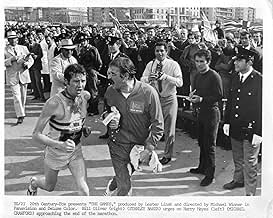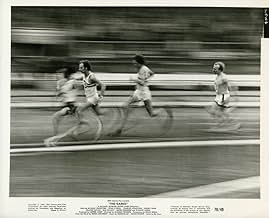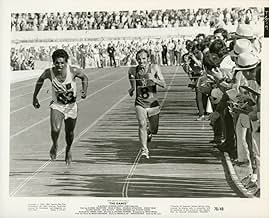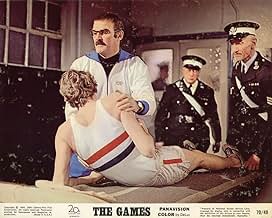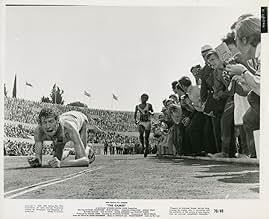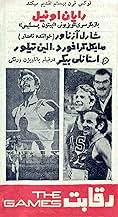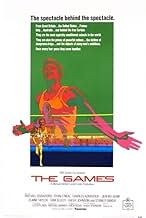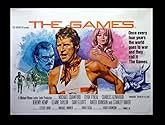IMDb RATING
6.1/10
531
YOUR RATING
Four marathon runners (one from England, one from the U.S., a Czechoslovakian, and an Australian Aborigine) prepare to run in the Olympic games. The film follows each one and shows what thei... Read allFour marathon runners (one from England, one from the U.S., a Czechoslovakian, and an Australian Aborigine) prepare to run in the Olympic games. The film follows each one and shows what their motivations are for running in the games.Four marathon runners (one from England, one from the U.S., a Czechoslovakian, and an Australian Aborigine) prepare to run in the Olympic games. The film follows each one and shows what their motivations are for running in the games.
- Director
- Writers
- All cast & crew
- Production, box office & more at IMDbPro
Featured reviews
Michael Winner made a lot of rather variable films before he found his true vocation as a restaurant critic.This one is prime ham.It is rather difficult to take seriously for one minute.With scrawny Aznavour and Crawford looking like they couldn't go 100 yards. A athletics is not my sport and the same goes for Winner.
bringing stories together in a movie is an art form and this is an excellent painting, micheal winner where did it all go wrong? crawford, baker and o neal are never better and charles aznavour? i have not seen this film for 20 years but long for the day to see it again does anyone know how?
This movie has aged, of course it's going on for 40 years so that is understandable. Never the less it represents a time gone by, its politically incorrect, full of racially insensitive remarks and highlights the conflict with professionalism/amateurism, drugs and the political grandstanding that went on back in the 60's,70's and 80's in track and field. As an other reviewer says the Olympics was the ideal forum where sport was all about politics.
It's a movie really for track and field enthusiasts although it's interesting to see a very young Michael Crawford (who actually had top billing for this movie) and Ryan O'Neal in his love story glory (it had not been released) and a young Sam Elliot who you would never recognize today but sounds the same. If I hadn't known better I would have said his voice was dubbed, but no it actually was Elliot's voice which would become better known as his career progressed. Crawford never hit the big time in movies but would be better known in comedy and stage by the late 70's and 80's. O'Neal ironically became typecast in his love story role which he never really shook that off all but disappeared from the screen by 1980.
As for the political incorrectness, it starts almost at the beginning. Back in those days milk was the stable drink but nowadays because of the fear of heart disease and bad cholesterol gator aid or some ridiculously priced glucose based drink that is supposed to re-balance the fluids in the body would be the primary beverage, milk just won't cut it! In the second scene while at Yale University Reynolds gets into a "binge drinking" contest. Of course, that's really what it amounts to of but here it's innocently described as a 'Chug-a-lug' contest where the prize is a night with one of the (co-ed or sorority girl?) girl students. Both drinkers pass out and today Women's advocate groups and the college establishment would freak at this type of activity, you certainly can't make light of things like that today.
The aborigine Australian runner Sunny "who is used to the heat" and runs in bear foot learned to run because he chases kangaroos in the bush is also another politically incorrect stereotype that won't cut today either. Also portraying Harry Hayes coach Bill Oliver as a homosexual should not be overlooked. It was meant to be subtle but it didn't fool me at all, the aggression, the drooped moustache, the sexual tension with Hayes girlfriend as well as the jealous looks, it was just all too apparent.
It's obvious that a lot of the film was left on the cutting room floor, probably for time constraints, yet it is still allows for character development. In addition you can see at first hand the cultural differences and training methods each runner uses in the old days of "shamateurism ". I'd have to say that all of the athletes that were portrayed Harry Hayes, Vedick , Sunny Pintubi and Reynolds from the UK, Czechoslovakia, Australia and USA respectively were well cast and very believable as runners.
The climax of the movie is worth waiting for and the gut wrenching Jim Peters moment (Vancouver 1954) portrayed by Harry Hayes is a spectacle. Great commentary from both BBC broadcaster Ron Pickering and former US Olympian Rafer Johnson for NBC, it's well worth a watch for all of the above
It's a movie really for track and field enthusiasts although it's interesting to see a very young Michael Crawford (who actually had top billing for this movie) and Ryan O'Neal in his love story glory (it had not been released) and a young Sam Elliot who you would never recognize today but sounds the same. If I hadn't known better I would have said his voice was dubbed, but no it actually was Elliot's voice which would become better known as his career progressed. Crawford never hit the big time in movies but would be better known in comedy and stage by the late 70's and 80's. O'Neal ironically became typecast in his love story role which he never really shook that off all but disappeared from the screen by 1980.
As for the political incorrectness, it starts almost at the beginning. Back in those days milk was the stable drink but nowadays because of the fear of heart disease and bad cholesterol gator aid or some ridiculously priced glucose based drink that is supposed to re-balance the fluids in the body would be the primary beverage, milk just won't cut it! In the second scene while at Yale University Reynolds gets into a "binge drinking" contest. Of course, that's really what it amounts to of but here it's innocently described as a 'Chug-a-lug' contest where the prize is a night with one of the (co-ed or sorority girl?) girl students. Both drinkers pass out and today Women's advocate groups and the college establishment would freak at this type of activity, you certainly can't make light of things like that today.
The aborigine Australian runner Sunny "who is used to the heat" and runs in bear foot learned to run because he chases kangaroos in the bush is also another politically incorrect stereotype that won't cut today either. Also portraying Harry Hayes coach Bill Oliver as a homosexual should not be overlooked. It was meant to be subtle but it didn't fool me at all, the aggression, the drooped moustache, the sexual tension with Hayes girlfriend as well as the jealous looks, it was just all too apparent.
It's obvious that a lot of the film was left on the cutting room floor, probably for time constraints, yet it is still allows for character development. In addition you can see at first hand the cultural differences and training methods each runner uses in the old days of "shamateurism ". I'd have to say that all of the athletes that were portrayed Harry Hayes, Vedick , Sunny Pintubi and Reynolds from the UK, Czechoslovakia, Australia and USA respectively were well cast and very believable as runners.
The climax of the movie is worth waiting for and the gut wrenching Jim Peters moment (Vancouver 1954) portrayed by Harry Hayes is a spectacle. Great commentary from both BBC broadcaster Ron Pickering and former US Olympian Rafer Johnson for NBC, it's well worth a watch for all of the above
In 1970, between working with Oliver Reed in Swinging Sixties flicks and Charles Bronson in exploitation crime, a mainstream Michael Winner directed THE GAMES, centering on a group of worldwide runners training for the Rome Olympics... but the trainers are the most intriguing characters...
In particular Stanley Baker, at this point a British veteran actor (who always looked older than he actually was), as a former running champion with a limp so serious he never lets the viewer forget...
Which takes the kind of energy that's completely lacking in the extremely miscast Michael Crawford as a milkman turned record-breaking sprinter (randomly romancing ingenue Elaine Taylor), whose lightweight acting chops seems more befitting the quirky comedies he was used to...
Although his scenes with Baker are pretty good because the tough coach makes every scene count... As does the Australian Aborigine's own trainer, more of a promoter, in get-rich-quick-schemer (and kangaroo poacher) Jeremy Kemp, as offbeat-crooked as Baker is headstrong-intense...
Meanwhile Ryan O'Neal's American runner hardly has a coach at all... A pill-popping womanizer with a breezy (albeit also miscast) sex symbol appeal, he seems like part of another movie altogether....
In fact every participant's individual story from THE GAMES (including an aged Frenchman seeking a comeback) feels underdeveloped since director Winner, using a barrage of that era's zoom shots and choppy edits, has to stuff them all inside a single 100-minute sports programmer that passes the time decently...
But could have been better if Stanley Baker only had another runner/actor to train, and more time to do so.
In particular Stanley Baker, at this point a British veteran actor (who always looked older than he actually was), as a former running champion with a limp so serious he never lets the viewer forget...
Which takes the kind of energy that's completely lacking in the extremely miscast Michael Crawford as a milkman turned record-breaking sprinter (randomly romancing ingenue Elaine Taylor), whose lightweight acting chops seems more befitting the quirky comedies he was used to...
Although his scenes with Baker are pretty good because the tough coach makes every scene count... As does the Australian Aborigine's own trainer, more of a promoter, in get-rich-quick-schemer (and kangaroo poacher) Jeremy Kemp, as offbeat-crooked as Baker is headstrong-intense...
Meanwhile Ryan O'Neal's American runner hardly has a coach at all... A pill-popping womanizer with a breezy (albeit also miscast) sex symbol appeal, he seems like part of another movie altogether....
In fact every participant's individual story from THE GAMES (including an aged Frenchman seeking a comeback) feels underdeveloped since director Winner, using a barrage of that era's zoom shots and choppy edits, has to stuff them all inside a single 100-minute sports programmer that passes the time decently...
But could have been better if Stanley Baker only had another runner/actor to train, and more time to do so.
Tedious, occasionally absorbing drama chronicling the stories of four male runners from different parts of the globe preparing themselves for the Rome Olympics. Michael Crawford, as the British dairy-deliverer who is found to have an uncanny track time, is the central focus of the film and his early scenes wowing all the hardened experts are fresh and well done; Ryan O'Neal, as the American jock with the (uh oh!) heart condition, is engaging simply because he's so young and eager (he would re-team with screenwriter Erich Segal the same year for "Love Story"). British-made film from erratic director Michael Winner supposedly travels around the world, yet the various locations are not captured to any particular advantage (the look of the picture is stuck in a British rut). The relationship between Crawford and his demanding coach is the most intriguing part of the movie--yet the closer we get to the Olympics finale, the faster interest tends to wane in these characters. ** from ****
Did you know
- TriviaA then-unknown Sir Elton John sang the Francis Lai and Hal Shaper-penned "From Denver to L.A." as part of the film's soundtrack, which was issued in the U.S. by Viking Records (LPS-105). He was so little-known at that point, that he was credited on the label as "Elton Johns". The label planned to issue the song as a single (VIK-1010, backed with "Warm Summer Rain" by The Barbara Moore Singers), and promotional copies were pressed, but John, who first hit stardom towards the end of 1970, had the record withdrawn before commercial copies could be pressed. Upon his reaching superstar status, promotional copies of the "From Denver to L.A." single have become prized collector's items and an interesting curio in John's recorded catalogue.
- GoofsAt once stage during a particularly twisty and narrow part of the race on Rome's streets, the pace vehicle is forced to go so slow that it forces leader Hayes almost to a standstill to avoid colliding with it.
- ConnectionsReferenced in Vsechnopárty: Episode dated 14 April 2017 (2017)
- How long is The Games?Powered by Alexa
Details
- Release date
- Country of origin
- Language
- Also known as
- The Games
- Filming locations
- Copenhagen, Denmark(kine weekly 16/11/1968)
- Production company
- See more company credits at IMDbPro
- Runtime
- 1h 40m(100 min)
- Color
- Aspect ratio
- 2.35 : 1
Contribute to this page
Suggest an edit or add missing content

